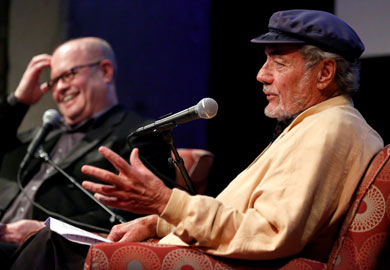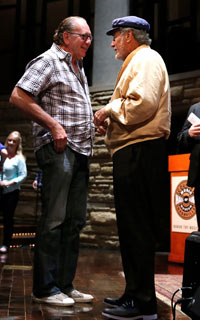

Jimmy Bowen with Museum Writer-Editor Michael McCall. Photo: Donn Jones.
Jimmy Bowen whisked onto the stage of the Country Music Hall of Fame and Museum’s Ford Theater Saturday, April 12, with a declarative, “What the hell happened to this town since I left?”
The museum’s Michael McCall replied that much of the city’s change and growth is a result of Bowen’s legacy. Credited with boosting Nashville’s clout for label operations, recording technology, and executive positions for women, Bowen went on to charismatically chronicle his career which brought him from Los Angeles to Nashville at the turn of the ’70s.
Bowen recalled the Garth Brooks era and how after seeing the performer’s live show, he instructed his staff to earmark 75 percent of their budget for “the biggest [artist] of them all.” “When something like that happens, it had to be like Elvis or The Beatles,” said Bowen, whose career also includes work with Frank Sinatra, Glen Campbell, Mel Tillis, Kenny Rogers, Dean Martin, Hank Jr., George Strait, Reba McEntire and a few self-described “misses,” including passing on The Eagles.
“When you look back, you say ‘I’ll be damned, I was working with Country music all along,'” reminisced Bowen of the relationships and experiences. (He absorbed Phil Spector‘s work while writing and producing Campbell across the hall in Los Angeles.) “I’ve always been aware of signs, and follow them,” he said.

Pres./CEO Warner Music Nashville, John Esposito visits with Jimmy Bowen after the program. Photo: Donn Jones.
Those types of friendships led to executive positions at Chancellor Records, Sinatra’s Reprise Records, and MGM Records before Bowen’s attention turned to Nashville in an effort to discover why records weren’t selling while singles were.
“I didn’t know how to record fiddle, but knew how to record twenty at a time,” recalled Bowen of adapting to the genre. “I had the best education. Tompall Glaser taught me the history of the music and business – if it hadn’t been for that, I wouldn’t have understood how to change anything here.
“I started to build the first label in Nashville with an accounting department, and marketing and sales, which had previously been done in Los Angeles or New York.
“I paid musicians double-scale and brought cartage to Nashville.” This gave musicians the freedom to create music rather than spend time hauling and loading equipment. Bowen also leveraged label contracts to justify millions in upgrades for a studio owner.
“When I worked with Dean and Sinatra, I learned it was their music, not mine,” noted Bowen, who holds the record for the most MusicRow Producer of the Year wins with eight consecutive honors. “I wanted artists to co-produce so they would understand hit songs and figure out what they want to say. I explained to Reba that albums open like concerts, then they peak, valley and close. And she understood.”
During Bowen’s reign, he was quick to promote the advantages of music producers as label heads, which also included Tony Brown and James Stroud. “At that time, there had been a distrust from artists for labels,” said Bowen. “I mainly said [producers were better label heads] because the competition was otherwise.”
“I’ve been accused of using the press,” he reminisced. When Brooks’ “Thunder Rolls” music video was banned, Bowen hired PR representation for news programs, print outlets and more because “The best thing is to be banned! We changed it from music to a national topic about a woman standing up for herself.”
Of female executives, Bowen recalled, “Dollars weren’t huge when I arrived. I figured out what [staff] I needed, then projected sales to meet that. For some reason women bought the concept that if you ‘take care of the music, it will take care of you,’ and they worked their butts off.”
The label titan departed Nashville, when he was then helming Capitol Nashville, in the early ’90s after a cancer diagnosis.
The two hour discussion was part of the Reba: All the Women I Am exhibition, which is slated to close June 8.

Category: Featured
About the Author
Eric T. Parker oversees operations and contributes editorial for MusicRow's print magazine, MusicRow.com, the RowFax tip sheet and the MusicRow CountryBreakout chart. He also facilitates annual events for the enterprise, including MusicRow Awards, CountryBreakout Awards and the Rising Women on the Row. eparker@musicrow.com | @EricTParkerView Author Profile


